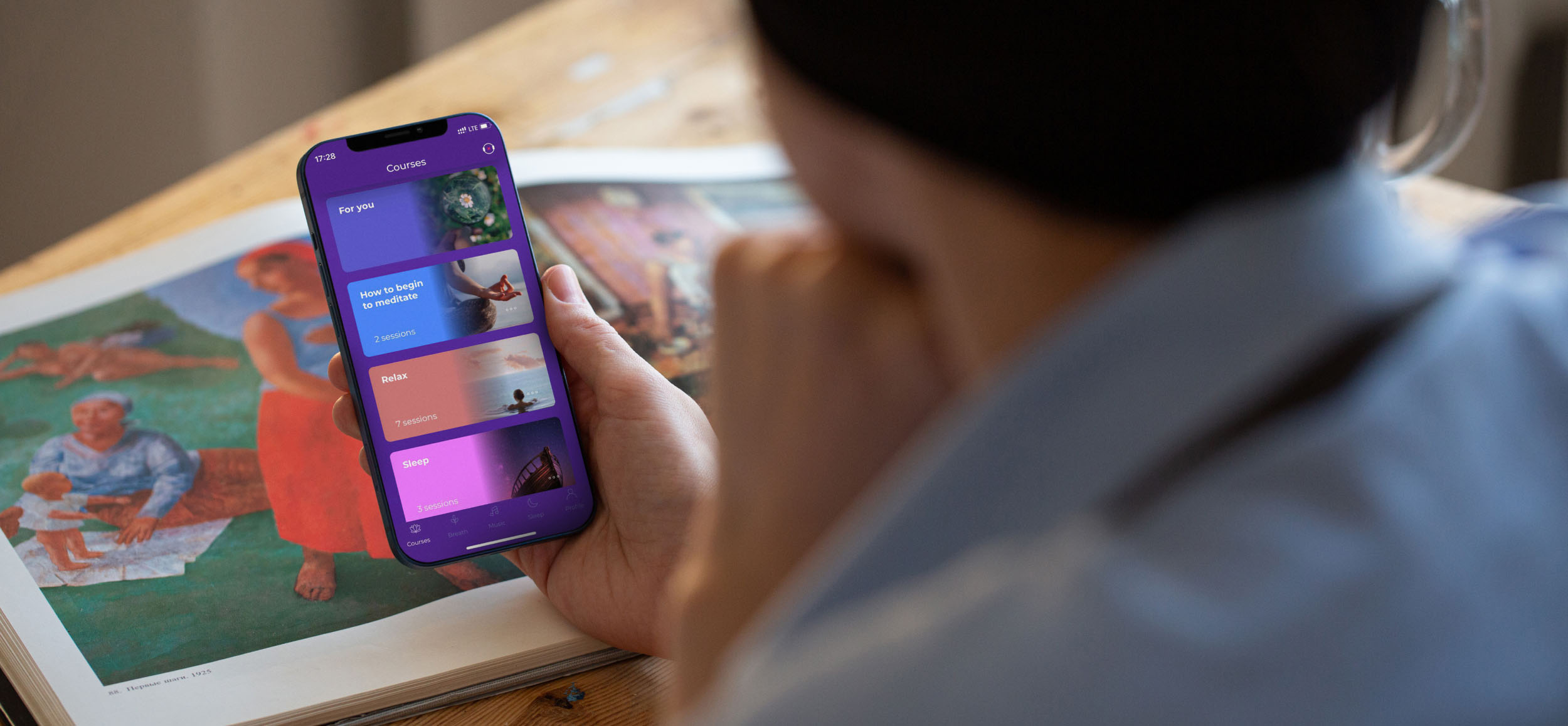
How to Choose a Meditation App for Beginners
Nowadays meditation apps for beginners don’t lack in numbers, from Smart Meditation to Calm – and it’s definitely a good thing. However, the downside is that when someone is just making their first steps in meditation, they can get overwhelmed by this wide variety of choices.
In this article, we will guide you through the whole process of choosing the best app for beginner meditation and will give many tips for every step of the way.

Understanding Your Needs as a Beginner
If you are new to meditation and you’d like to give a guided meditation app a try, the first question you need to answer is: “What do I need?” Let’s break this answer down into three parts and see what exactly you need to consider:
Identifying Your Goals and Objectives
Meditation is generally associated with learning to be more relaxed; however, this is not the only effect you can achieve. So think about what exact benefits you hope meditation will bring into your life. Are you trying to become less stressed, become more focused, or get better sleep? Once you make up your mind, select an app with guided meditation courses that suit your goal.
Determining Your Preferred Meditation Style
Just as with effects, there are many different meditation practices out there, so it’s crucial to investigate them all and choose the one(s) that seem the most appealing. Don’t limit yourself to basic mindfulness meditation – experiment with body scans, breathing exercises, loving-kindness and mantras. Decide how each style makes you feel and what helps better in restoring your sense of peace and clarity – some applications are better than others at certain practices.
Considering Time Commitment and Accessibility
It’s also essential to be realistic about how much time you can devote to meditation. Good meditation apps for beginners offer shorter meditation sessions, from a few minutes to about 10 minutes, and keep your schedule in mind. Another that shouldn’t usually be a problem, but still – look at the app’s compatibility with various devices. The vast majority of modern meditation apps are made to be able to connect with everything, but it’s better to double-check before you pay for the subscription.
Essential Features to Look for in a Meditation App for Beginners
Now that we’ve decided on what we want from an app, let’s get a bit more technical and look into the most desired features of a guided meditation app:
User-Friendly Interface and Navigation
Look for an app with a simple, user-friendly interface that makes navigating between features and sections intuitive. Also pay attention to the overall aesthetics – using an app with a visually pleasant design with calming colors only adds to your meditation experience. Finally, it’s an added bonus if the app settings allow you to tweak the interface to your preference, for instance, having a different color scheme.
Guided Meditations for Beginners
When you’re only starting out, look for applications that offer guided meditations with simple instructions and focused direction – this will help you to ease yourself into the practice. Guided meditation in general is great for beginners as having experienced meditation teachers or specialists lead the sessions can inspire confidence right from day one. A good app should also be able to provide you with well-structured courses that help build a strong foundation for your practice.
Variety of Meditation Styles and Techniques
We’ve already talked about the variety of techniques and how important it is to experiment. That’s why it’s often a good idea to pick an app that has it all – body scans, breathwork, loving-kindness, mindfulness and many others. At the same time, if you feel that you’re only interested in one specific practice, you may be able to get more out of an app that focuses purely or mostly on that practice.
Customizable Meditation Sessions
Staying flexible in your meditation practice is key to staying committed and consistent. That’s why you want to focus on apps that enable you to customize your meditation sessions as much as possible. Look for software that lets you modify the intervals for guided meditations or quiet periods, change the background music or natural sounds, or change the duration of your session.
Progress Tracking and Reminders
Best meditation apps for beginners always include features like progress monitoring and reminders that make it simpler to stay motivated and keep track of your progress. So go for apps that let you track streaks, register your meditation sessions, and collect achievements for reaching certain goals. On top of that, by sending you notifications at times you preset, a good app will help you develop a consistent meditation routine.
Integration with Other Devices or Apps
This feature sometimes gets overlooked, and, frankly, not every user needs it, but it’s still important. Look at whether the meditation app can be integrated with other tools or programs you use regularly. For instance, you can track your meditation sessions together with other health information with several apps that can sync with your fitness tracker or wristwatch. Integration with music streaming services is also a good asset because it enables you to listen to the music you like while meditating.
Additional Resources and Support
Lastly, the best beginners meditation app should provide more than just guided sessions. Some apps include supplemental materials like articles, videos, or podcasts about mindfulness and meditation. These materials can help you gain a deeper understanding of the practice, provide insightful advice, and help you stay motivated. Some apps also provide community support or access to meditation groups, enabling you to meet others who share your interests and exchange experiences.

Evaluating and Comparing Meditation Apps
Finally, once you’ve narrowed it down to a couple of apps that you like, it’s time to consider the following dealmakers to choose the best one:
Creating a Pros and Cons List
Write down any features, functions, or aspects of the user experience that you find noteworthy or appealing. You might list features like a simple user interface, a large selection of guided meditations, or the opportunity to personalize your sessions. Likewise, mention any restrictions or areas where the app can fall short of your expectations. The lack of sophisticated features, a complicated navigation method, or a small range of meditation techniques are a few examples. Once you do that, it’ll be easier for you to compare apps between each other and it’ll make it simpler for you to choose the option that suits you best.
Trying Demo Versions or Free Trials
Using the demo versions or free trials is another excellent approach to evaluate them. Many applications offer a limited amount of access or free trials so that users can test out the features before deciding to subscribe. For instance, you can test our Smart Meditation app’s 7-day free trial and make a decision after that. Pay attention to how well it performs, how simple it is to use, how well the guided meditations are made, and any other elements that are important to you. You can learn a lot about which app suits you the most by contrasting them side by side.
Considering App Pricing and Subscription Options
Naturally, you should also look at the app’s cost and pricing model – see whether it’s a one-time purchase, a monthly subscription, or a yearly subscription and think about which one you prefer. Also consider the variety and the quality of the guided meditations, the accessibility of other materials like podcasts or meditation classes, and any other distinguishing features. Finally, beware of any hidden fees or restrictions.
Assessing App Support and Customer Service
Lastly, find out if the app has a good user support service and whether it offers such valuable support resources as FAQs, tutorials, or troubleshooting instructions. Also make sure to read through user reviews or testimonials that highlight the quality of developer’s customer service, and look into the developer’s reputation in general. Having dependable assistance and responsive customer care is an often overlooked, yet still important factor.
Conclusion
When choosing the best meditation app for beginners, first decide on what you’re looking to get from meditating, which meditation types you’d like to try, and how much time you’re ready to devote to the practice. After that, start looking for apps that offer strong functionality including a wide variety of courses, user-friendly interface, numerous integrations, progress tracking and customization, just to name a few. And, finally, when you have a couple of products in mind, the best beginner meditation app should offer a free trial, the best user support, and, overall, the best value for money.






